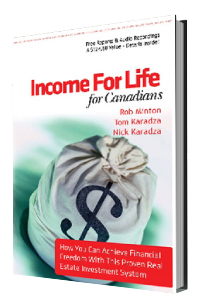Make Money Real Estate Investing
4 Ways Real Estate Can Generate Income For Canadians
You don’t invest in real estate without some sort of goal, whether short term or long term, to make money. But to make money real estate investing is far from a guarantee. If you don’t know what you’re doing, real estate can be costly. It takes knowledge of the market, the types of properties, and what’s right for you and for your local market.
Flipping
The idea with flipping is buying low and selling high. You want to try and buy a home that’s below market value, typically with some sort of “problem” that’s making it valued below the market average, fixing that problem, and then selling (ideally for more than you’re financially in for).
For more on flipping to make money real estate investing, you can read our article on Flipping Houses in Canada here!
Rent (cash flow and building equity)
Owning rental properties can be a great way to make money, but it can also act like a savings account. Better yet, it works like a savings account that someone else is building your savings for you!
Each month that your tenant pays rent, assuming it covers the cost of the monthly expenses, you could be looking at a positive monthly cash flow. This is money left over after all of the property expenses.
But that’s not the only money you’re making.
When the rent is used to cover your mortgage payment, part of each payment goes towards the principal. That means every payment you owe the lender (mortgage provider) a little less.
Another way to look at it is that with each payment you have more equity built up in the house. That’s the money you’d get if you ever sold the property (the sale price minus what you owe the mortgage provider).
However, you don’t necessarily have to wait to sell to access the equity in your home.
You may qualify to refinance your property or get a Home Equity Line Of Credit (HELOC), which will allow you to draw a percentage of the equity in your home to use elsewhere. Many people do this for repairs and upgrades to the property. Others use this money to invest in another property, but more on that in a bit.
Rent is the most obvious way people make money in real estate, even if it’s very little money in their pockets after expenses each month. Renting has a whole different set of risks from flipping a property. Most people renting homes own them long term, so there’s more security with the market when you plan to own long term. However, risk is still there, and you’re also counting on finding tenants and that your tenants will pay and treat the property with respect. Being a landlord is not for everyone. But there are ways to prepare yourself and set yourself up for a higher chance of success.
Click here to register for our free training class, where you’ll learn how thousands of Canadians are successfully investing in nice homes in nice areas in Ontario.
Appreciation
People often look at appreciation rates in real estate and think, I could do better than 6% a year investing in X (be it stocks or something else).
A great benefit to real estate, compared to other forms of investment is your ability to leverage your wealth. You can invest $100,000 into a $500,000 and get a mortgage for the remaining $400,000.
You’re gaining from the inflation and appreciation of a $500,000 asset, not the $100,000 investment.
If you’re renting the property, and your tenant is covering your mortgage, you’re never really paying that $400,000 that you’re leveraging, but you’re gaining from it all the same.
A 20% down payment really means you’re gaining access to an asset 5 times your investment.
Let’s look at a $500,000 house. Instead of paying 20% down ($100,000), you put that money into some sort of investment that offers an 8% appreciation, 2% higher than in the house.
At the end of 25 years, your $100,000 would have grown to $684,848. However, that $500,000 house would now be worth $2,145,935. Even if your investment offered a 10% yearly appreciation, it would only end up at $1,083,471.
True, eventually the higher appreciation rate would pass the house, but it would take 44 years for that $100,000 appreciating at 10% to finally pass a $500,000 appreciating at 6%.
Even though your initial investment is the same, the appreciation of the house is based on the entire value of the home, not just your initial investment.
Multiplying Your Assets
What if you pulled money out of that house to purchase a second house at some point? Now you have two assets appreciating for you.
At year 10, your $500,000 home is now valued at $895,424. You pull $180,000 out of the home to use as a 20% down payment to purchase another $900,000 home. Now, both homes are appreciating at 6%. Your wealth gained through appreciation doubles.
What other investment lets you take money from one asset to purchase another asset at the same value?
---
Investing in real estate, no matter the strategy, there are risks involved. Especially if you’re over-leveraging. That being said, if done thoughtfully and with a proven strategy, many people make money real estate investing.
Some Cool Free Stuff...
Step 1:
|
Grab a free digital copy of our real estate investing book, Income For Life For Canadians, right here. This book has been downloaded over 22,597 times and has helped hundreds of investors kick-start their investing with simple and straight forward strategies that you can implement right here in Canada. |
 |
|
You'll also receive our weekly [Your Life. Your Terms.] email newsletter with the latest investing updates and videos. |
Step 2:
|
Free Weekly Investing Videos & Articles: Get the latest updates and join the over 10,000 other Canadians enjoying the weekly [Your Life. Your Terms.] email newsletter. The email is sent out each Thursday. And as a little bonus we'll give a FREE digital copy of the book, Income For Life For Canadians, too! |
Your Life. Your Terms.
Step 3:
|
Free LIVE Investing Class: Do you live in the Greater Toronto or Golden Horseshoe Area? Come out to our next introductory "Investing in Nice Homes in Nice Areas" Real Estate Class. |
 |
|
It's 90-minutes and you'll learn a ton - promise!Thousands of investors have now joined us for this class and the feedback has always been amazing. |



